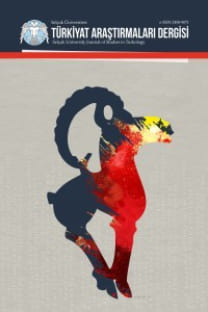MİTİK, FOLKLORİK VE DOĞAL BİR UNSUR OLARAK KURŞUNUN KLASİK TÜRK ŞİİRİNDEKİ YANSIMALARI
Mitik dönemlerden itibaren yerleşik hâle gelen bazı kültürel unsurlar, farklı bir dil ve biçimle klasik Türk şiirinde yerini bulmuştur. Klasik Türk şiirinin genelde bütün mitler, özelde Türk mitolojisinin taşıyıcısı olduğunu gösteren ayrıntılardan biri de ilkçağlardan itibaren keşfedilen, işlenen bir maden olarak insanlığın gelişim sürecinde rol alan kurşundur. Kurşun, arkaik dönemlerden beri taşıdığı doğal özellikler ve insanın onu kullanma, anlamlandırma biçimleriyle önce pratikte önemli hale gelen sonra dil ve sanatta bahsedilen doğal varlıklardandır. Kurşuna dair mitolojilerde yer alan inanç, söylence ve ritüeller klasik Türk şiirinde de yansımasını bulmuştur. Kurşunun kulağı sağır etmesi, kötü varlıklarla mücadelede yüklendiği rol ve bir cezalandırma aracı olarak geçmişten günümüze uzanan serüvenine ait ipuçlarını klasik şairlerin divanlarında görmek mümkündür. Çalışmada; kurşun ve ona dair uygulamaların mitolojideki yeri ve bunun klasik Türk şiirindeki yansımaları üzerinde durulmuş; klasik Türk şiirinde beyitlere yansıyan “kurşun dökmek, kulağa kurşun akıtmak, şeytan kulağına kurşun, boğazından kurşun akıtmak” ibareleri etrafında oluşturulan hayal dünyasının eski inançlar ve mitolojiyle bağlantısı ele alınmıştır.
THE REFLECTİONS OF LEAD AS A MYTHİCAL, FOLKLORIC AND NATURAL ELEMENT IN CLASSİCAL TURKİSH POETRY
Some cultural elements that have become settled since the mythical periods have found their place in classical Turkish poetry with a different language and form. In classical Turkish poetry, there are traces of all myths in general, and one of the details showing that it is the carrier of Turkish mythology is lead, which has played a role in the development process of humanity as a mineral discovered and processed since ancient times. Lead is one of the natural assets that first became important in practice and then mentioned in language and art, with its natural properties and the way people use and interpret it since archaic times. It is possible to see in the diwans of classical poets the clues of lead's deafening, its role in the fight against evil beings and its adventure from the past to the present as a punishment tool. Based on these clues, the structure of classical Turkish poetry that tells a lot with few words and the beliefs, imaginations, and mythology that the poets fit into two lines will be made more understandable. In classical literature, some expressions in poems can be noticed through associations, passing through the filter of different cultures and beliefs. In the study, the place of lead and its applications in mythology and its reflections in classical Turkish poetry are emphasized. The connection of the fantasy world with ancient beliefs and mythology, which was formed around the phrases "pouring lead, pouring lead into the ear, lead to the devil's ear, lead to the throat" reflected in the couplets in classical Turkish poetry is discussed.
Keywords:
Mythology, folklore, classical Turkish poetry, lead, shamanism,
- ISSN: 1300-5766
- Yayın Aralığı: Yılda 3 Sayı
- Başlangıç: 1994
- Yayıncı: Selçuk Üniversitesi
Sayıdaki Diğer Makaleler
TÜRKİYE’DE PETROL VARLIĞI ÇALIŞMALARINA BİR ÖRNEK: SCHWENNESEN RAPORU
FİNANS VE EMPERYALİZM: OSMANLI COĞRAFYASINDA ALMAN BANKALARI (1897-1914)
BULGAR KOMİTECİ MİHAİL GERCİKOV’UN EDİRNE VİLAYETİNDE ASAYİŞİ BOZMA GİRİŞİMLERİ (1903-1908)
MİTİK, FOLKLORİK VE DOĞAL BİR UNSUR OLARAK KURŞUNUN KLASİK TÜRK ŞİİRİNDEKİ YANSIMALARI
EMRE KÖYÜ CARULLAH BİN SÜLEYMAN CAMİİ KALEMİŞLERİ
Arkın ONGAN, Ayşe Zehra SAYIN, Ali Fuat BAYSAL
TÜRK MİZAH BASINI ÜZERİNE GÖRSEL BİR İNCELEME: KARAGÖZ GAZETESİ
Abdulgani ARIKAN, Yasemin GÜLŞEN YILMAZ
ORTA ÇAĞ MACAR KRALLIĞI’NDA SEKELLERİN ASKERÎ FAALİYETİ ve OSMANLI-MACAR MÜCALESİNDEKİ KONUMU
AFGANİSTAN ÖZBEK EDEBİYATINDA ÖNEMLİ BİR ŞAİR: M. ÂLİM KÛHKEN
